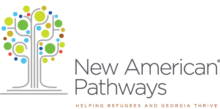Originally from Burma (now Myanmar), Abu had built a life as a typical teenager, attending school and helping his father out at their family business when he could. However, as a Muslim and as a member of the minority Rohingya ethnic group, Abu faced discrimination and persecution in his home country.
In 2008, at age 15, Abu left his country on a boat in an attempt to reach Malaysia. However, due to unforeseen weather, the boat never reached Malaysia. Instead, Abu and the 91 other people on board were stuck at sea for 27 days, with only 7 days’ worth of food and water. Throughout the journey, at least 21 people died due to starvation and all suffered as the ship began to leak.
After many days drifting at sea, unsure of their exact location, those on the ship spotted a Sri Lankan fishing boat and some jumped into the river to swim to the boat to seek help for all. The fishermen called the Sri Lankan Navy, who rescued Abu and the rest of the survivors of the treacherous journey and brought them to a refugee camp in Sri Lanka.
Abu lived in Sri Lanka, a majority Buddhist country, as a refugee for five years. While he developed the English and technical skills he now uses as a resettlement contractor at New American Pathways, he also developed an attitude of acceptance towards those of all faiths, especially Sri Lankan Buddhists, despite the pain that Buddhists in Myanmar had inflicted upon his entire family.
In August 2017, further violence broke out in Myanmar targeted specifically at the Rohingya ethnic group that forced the rest of Abu’s family to flee their homes and seek refuge in other countries. Two of Abu’s brothers now live in Malaysia while his parents reside in a refugee camp in Bangladesh with many other Rohingya refugees.
After being resettled in the U.S. in 2012, Abu sought out opportunities to continue growing his attitude of acceptance and appreciation by giving back to this country and assisting other Rohingya refugees during their resettlement here. In 2014, he started volunteering with the Burmese Rohingya Community Organization in Georgia, which seeks to guide new refugees from Myanmar throughout their transition to the U.S.
Abu and others in the organization lead cultural orientations, provide English language classes, assist members of their community to obtain driver’s licenses, lead domestic violence prevention classes, provide translation services, host citizenship classes and attend city council meetings to voice the needs of their community.
Abu further serves the Burmese Rohingya community in Georgia through his work in the Resettlement department of New American Pathways where he manages cases and assists Rohingya refugees during their resettlement process through translation services, driving services and by empowering them through his own experiences of navigating life in a new home.
Abu is married and has three children. He hopes they can live a confident and safe life where they can be whatever they want to be. He hopes that his daughter will become a doctor and his son will serve in the U.S. military so that they can both give back to a country that did so much for him and his family.
When asked why the United States should resettle more refugees, Abu points to his personal experience as a refugee and his time spent helping others transition to life in the U.S. Being a refugee in a new country has allowed him to see the importance of building a strong, diverse, and accepting U.S. culture. He also emphasized the essential aspects of humanity to love, support and welcome others. “We are all humans. When we take in refugees into the U.S…we are helping humans. If we have humanity, we help the other humans and we care about the humanity of those who are dying out there. The people who came to the US as refugees, they never ever forget they have help from US government. They never ever will be against the U.S. Refugees are part of the solution, not a part of the problem.”
Ask Congress: #WhereRtheRefugees? Call in with us!
